Department of Farm Power and Machinery
About Department
The department has unique importance since establishment in Faculty of Agricultural Engineering. The research mainly focuses on the development of low cost farm implements and machineries for the farmers. The department has at its credit more than ten advanced farm machineries and implements developed for mechanization of small farm. Besides research, department is running doctoral and post graduate programme in Farm Power and Machinery to generate personnel who fulfill the industries as well as farmers demand for advanced farming in the region.
Academic Programmes
Department is imparting education at under graduate, post graduate and doctorate degree levels.
Degree Programme
- Ph.D. (FMP) – 03 years with intake capacity 02
- M.Tech. (FMP) – 02 years with intake capacity 05
Infrastructure Facilities
- Work Shop
- Farm Implements Practical Shade
- Tillage and traction
- Farm Power
- Ergonomics
- Engineering Drawing
 |
 |
|
| Workshop | Farm Implements Practical Shade |
Mandate
Teaching:
Department presently has educational programmes upto doctoral level. Teaching is an important activity to teach courses at undergraduate, post graduate and doctoral level.
Undergraduate programme: The department offers various courses and electives of undergraduate Agricultural Engineering as per the norms of ICAR.
Postgraduate programme: The department has post graduate programme in Agricultural Engineering in the subject Farm Power and Machinery as per the norms of ICAR.
Doctoral programme: Department has started doctoral programme in Farm Power and Machinery since 2008.
Research:
Department is engaged in research for the betterment of farm mechanization in the university region. In the field of farm power and machinery department have developed various farm implements and machinery through the student involvements and in the research schemes. Many of farm implements and machineries have been evaluated in the university region for their users adoptability
Extension:
Department always believe in delivering technology at grass root level through demonstrations, exhibitions and solving farmers problem through the field visit.
- Demonstration of farm implements at University as well on farmers field
- Display and demonstration of farm implements and machineries in National/State level Exhibition
- Arranging field day/field visit of farmers
- Shivar Pheri
- Popularization through state news papers and magazines
- Audio video mode of demonstration
Co-curricular activities:
-
Department is successfully hosting NSS and NCC activities of CAET
- Department have commercialized farm implements & machineries through entrepreneurship
- Department is involved in testing and inspection of farm implements and machineries which comes under rate contact of state government
-
Department also advices state government regarding farm machineries and implements
Research Activities/Achievements
National Agricultural Technology Project (NATP)
-
Completed an Adhoc scheme “Development of tractor operated sorghum harvester” sponsored by ICAR, New Delhi
- Completed an Adhoc scheme “ Mechanization of Dryland Agriculture” sponsored by ICAR, New Delhi
- Completed an Adhoc scheme “ Mechanization of Experimental Plot” sponsored by ICAR New Delhi
- Ongoing scheme on Technology Mission on Cotton (TMC), Mini Mode Mission I (MMI), Mechanization of Cotton production (Component 2.3) sponsored by ICAR New Delhi
All India Coordinated Research Project (AICRP) on Farm Implements and Machinery
1. Successfully conducted front line demonstrations prototype feasibility testing and custom hiring of improved and advanced farm implements and machineries for the popularization of mechanization in the university region.
MOU between Dr. PDKV, Akola and MAIDC, Mumbai
for commercialization of BBF planter cum interrow cultivator and Dalmill
Extension Activities and Achievements
-
Organized Farm Implements Day (Two days Meet of farmers and manufacturers)
- Organized Workshop of Quality Control in Farm Implements Production supported by Deptt of Agriculture, Government of Maharashtra
- Conducted HRD Training programme for KVK Staff of “ Mechanization of Small Farm”.
- Participated in state level agricultural exhibition.
- Publication of farm machineries information in leading news papers/magazines
-
Arranging demonstration for farmers
 |
||
| Demonstration of BBF planter cum interrow cultivator | ||
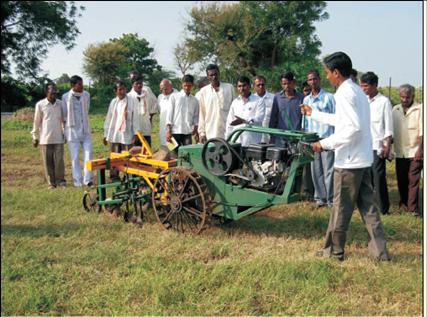 |
 |
|
| Demonstration of PDKV toolbar operated interrow cultivator | ||
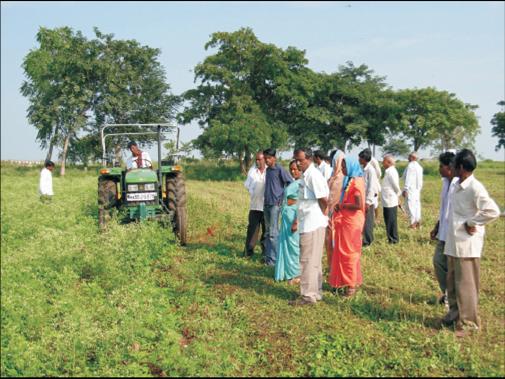 |
||
| Demonstration of PDKV tractor operated slasher | ||
 |
 |
|
| Participation in agricultural exhibition | ||
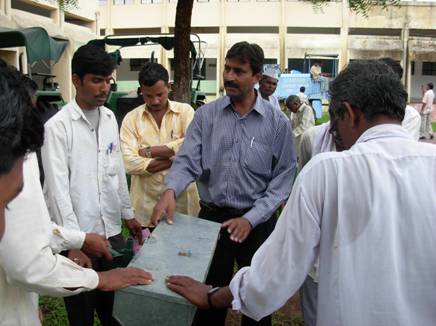 |
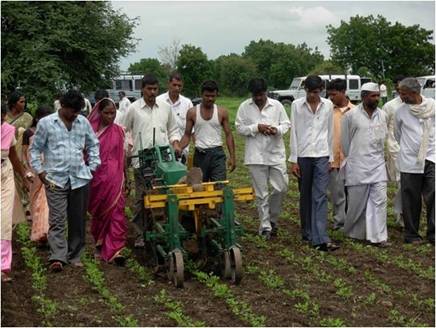 |
|
| Interaction with farmers during Shivar Pheri and demonstration | ||
 |
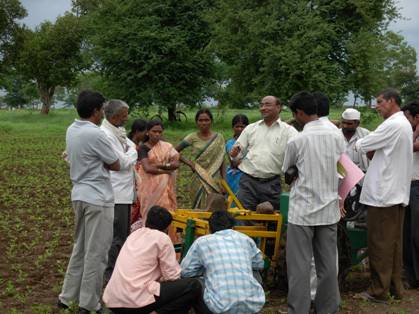 |
|
 |
 |
|
| Demonstration to the distinguish visitor’s | ||
- PDKV Tractor operated slasher
- PDKV self propelled power tool bar for various attachments for small farm mechanization
- PDKV self propelled power tool bar operated pneumatic planter attachment
- PDKV self propelled power tool bar operated interrow cultivator attachment
- PDKV self propelled power tool bar operated multicrop reaper attachment
- PDKV self propelled power tool bar operated slasher attachment
- PDKV self propelled power tool bar operated tiller cum BBF marker attachment
- Crop residue disintegrator
- PDKV Manual drip lateral coiler
- PKV pedal operated stem cutter
- BBF Planter cum interrow cultivator
- BBF planting technique to support mechanization of crop
| Name of Technology : PDKV Self Propelled Slasher | |
|---|---|
| Crop | Kharif & Rabi crops |
| Background |
The residue management in farming system is the emerging issue for the sustainable yield. Presently After harvesting of crops, residues are burn in open field. No in-situ recycling of crop residue practices are followed. The abundant crop residues are available for the recycling and thereby enhancing the soil health. The self propelled slasher, slashes standing crop residue and spreads it over the soil. The use of such machine saves the land preparation operation and provides the in-situ management of crop residue. |
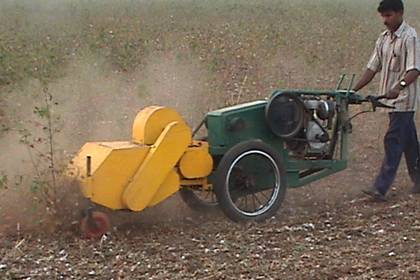 |
|
| Recommendation |
It is recommended to use Self Propelled Slasher for slashing all standing crop residues, grasses, bushes etc. |
| Year of Release | 2006 |
| Applications | For slashing all standing crop residues, grasses, bushes etc. |
| Advantages |
Low operation and maintenance cost. Suitable for slashing all standing crop residues, grasses, bushes etc. |
| Economics |
Cost of operation is Rs. 250 to 400 per hectare. Saving in cost over traditional land preparation operation is 45 to 75 per cent with ease in operation. |
| Name of Technology : PDKV Self Propelled Multi-crop reaper | |
|---|---|
| Crop | Kharif & Rabi crops |
| Background |
Sowing, interculture and harvesting operations need to be done timely. The harvesting operation is done by human labour in bending posture, which is most tedious & drudgerious operation. Delay in harvesting causes heavy losses in yield. Some of the crops are hard to harvest. Harvesting operation consists of cutting and conveying of crops. The harvesters basically designed for wheat crop are not suitable for crop like soybean, chickpea, and gram. The harvesters are difficult to operate in small field. The self propelled multi-crop reaper is found to overcome the difficulties faced in small farming. |
|
|
|
| Recommendation |
It is recommended to use Self Propelled Multi-crop reaper for harvesting of soybean, black gram, green gram, chick pea, safflower, paddy, wheat, pigeon pea, sorghum, maize, pearl millet and jute. |
| Year of Release | 2006 |
| Applications | For Harvesting of soybean, chickpea, gram etc. |
| Advantages |
Low operation and maintenance cost. Suitable for harvesting of soybean, black gram, green gram, chick pea, safflower, paddy, wheat, pigeon pea, sorghum, maize, pearl millet and jute. |
| Economics |
Cost of operation is Rs. 380 to 405 per hectare. Saving in cost over traditional operation is 65 to 70 per cent with ease in operation. |
| Name of Technology : PDKV Self Propelled Pneumatic Planter | |
|---|---|
| Crop | Kharif & Rabi crops |
| Background |
Sowing is the most important crop production operation. Traditionally, bullock power is mostly use for the sowing. The precision and timely sowing enhances the yield. Now a days the skill workers are not available for sowing operation. Similarly, the bullock and labour power is decreasing day by day which results in high cost of operation as well as delay in sowing.. Some crops can be sown by tractor in dry conditions only. Tractors are also not suitable for sowing some crops according to their sowing system and pattern. Frequent tractor operations in rainy season result high compaction problem in soil. With help of this planter it is possible to maintain the uniform seed to seed distance within the row. The self propelled pneumatic planter works in various soil conditions which satisfies the farmers sowing needs. |
 |
|
| Recommendation |
It is recommended to use Self Propelled Pneumatic Planter for Sowing of all seed crops. |
| Year of Release | 2008 |
| Applications | For sowing of all seed crops such cotton, soybean, black gram, green gram, chick pea, safflower, paddy, pigeon pea, sorghum, pearl millet etc. |
| Advantages |
Low operation and maintenance cost. Suitable for sowing all seed crops. Early emergence of plants. As it is the precision planting it saves cost towards seeds. |
| Economics |
Cost of operation is Rs. 240 to 300 per hectare. Saving in cost over traditional sowing operation is Rs. 510 per hectare with ease in operation. |
| Name of Technology : PDKV Self Propelled Inter-row Cultivator | |
|---|---|
| Crop | Kharif & Rabi crops |
| Background |
In crop production operations, interculture operation has prime importance for the proper growth and yield of crops. Traditionally, this operation requires more inputs in term of the labour and energy which results in high cost of operation. Traditional interculture operation is fatigue prone with very low in-situ moisture conservation. During interculture operation crops are damaged sometimes by traditional method. Self propelled inter-row cultivator is the highly efficient machine which removes weeds effectively with proper soil tilt required for growth of crops. The self propelled inter row cultivator is enable to work in any row spacing of all stages of crop growing with control on the working depth in soil.
|
 |
|
| Recommendation |
It is recommended to use Self Propelled Inter-row Cultivator for Interculture operations of all crops.
|
| Year of Release | 2008 |
| Applications | For Interculture operations of all crops. |
| Advantages |
Low operation and maintenance cost. It helps in moisture conservation as it does not invert the soil during weeding operation.
|
| Economics |
Cost of operation is Rs. 170 to 250 per hectare according to crop. Saving in cost over traditional interculture operation is 40 to 70 per cent with ease in operation.
|
| Name of Technology : PDKV Self Propelled Tiller cum BBF marker | |
|---|---|
| Crop | Kharif & Rabi crops |
| Background |
Tilling the soil in cloddy field as well as in orchards is generally done by bullock drawn ploughs which is drudgerous and time consuming. There is difficulty for the bullocks to work in the orchards and the quality of work done by traditional methods is less because of the restriction of the movement of bullocks to every corner of the field |
|
|
|
| Recommendation |
PDKV developed power tool bar operated tiller is recommended for tillage in cloddy field, orchard and for marking broad bed furrow (BBF). |
| Year of Release | 2009 |
| Applications | For tilling the soil in cloddy fields, orchard and for marking broad bed furrow (BBF) at a same time can be possible saving time and cost of operation. |
| Advantages |
Low operation and maintenance cost. Depth of cut set prior to operation in all cases was observed equals to the set depth. The actual field capacity was found as 0.137 ha/h with 79.5 % field efficiency. The actual field capacity of tiller attachment for BBF formation was found to be 0.46 ha/h with field efficiency of 79 % |
| Economics |
The operational cost was Rs. 783/- per hectare. The cost of operation for BBF formation was found to be 280 Rs./ha. |
| Name of Technology : Tractor operated PDKV Slasher | |
|---|---|
| Crop | Kharif & Rabi crops |
| Background |
The cotton is the major crop of vidarbha region, after harvesting the cotton stalks/ plants need to be immediately uprooted to avoid the loss of moisture and nutrients from the soil due to standing crop. Most of the stalks are uprooted by using manual fork or use of tractor operated V-blade/ duckfoot cultivator. The uprooted stalks collection their transportation and storage are very tedious and labour intensive operation. |
|
|
|
| Recommendation |
PDKV developed tractor operated Slasher is recommended for slashing of standing crop residue. |
| Year of Release | 2009 |
| Applications |
Slashing of standing crop residues of all the crops. Disintegration and incorporation of crop residue can be done easily by rotavator. |
| Advantages |
Low operation and maintenance cost. The average actual field capacity is 0.533 ha/h. Average fuel consumption is 7.52 lit/ha. The average field efficiency of the slasher is 83.44 %. |
| Economics |
The cost of operation was Rs. 346/- per ha. Cost saving was 76.5 % over traditional method. |
| Name of Technology : PDKV Manual Drip Lateral Coiler | |
|---|---|
| Crop | Grain, fiber and orchard |
| Background |
In drip irrigation system when the season of the crop have ended then it is necessary to collect the lateral from the field. The collection of the lateral from the field is a very tedious work. Sometime collection affect on the lateral by means of breakage etc. The traditional collection of the lateral from the field require the more labour and the time. To reduce the drudgery in such operation PDKV Manual Drip Lateral Coiler is the effective technology for the collection of lateral from the field. |
|
|
|
| Recommendation |
It is recommended to use PDKV Manual Drip Lateral Coiler. |
| Year of Release | |
| Applications |
For coiling and de-coiling of drip lateral. |
| Advantages |
Easy to transport and ease in operation. It cover the lateral area of 0.6 ha in one hour when use as coiler by using two human labours. |
| Economics |
Saving in collection cost and time of lateral. |
| Name of Technology : PDKV Disintegrator Machine | |
|---|---|
| Crop | Crop residue |
| Background |
This machine is useful for the disintegration of the crop residue after the post harvest operation. The disintegrated crop residues when kept with moisture for the 45 days easily convert in to organic manure or vermi compost. |
|
|
|
| Recommendation |
It recommended to use PDKV Disintegrator Machine for crop residue disintegration. |
| Year of Release | |
| Applications |
For organic manure preparation |
| Advantages |
Capacity of 180 to 200 kg/ha. |
| Economics |
Saving in cost of production of organic manure. |
| Name of Technology : PKV modified serrated disc plough for preparation of hard paddy land | |
|---|---|
| Crop | Paddy |
| Background |
The problem of land preparation after harvest of paddy has always been raised by the farmers of rice growing areas. The soil becomes very hard due to loss of moisture and is very difficult to till the land with conventional bullock drawn implements like desi plough, harrow etc. It is reported that even tractor operated MB plough could not be operated in this condition and it is needed to evolve some strategy for land preparation in paddy for rabi crop. |
|
|
|
| Recommendation |
It is recommended to use PKV modified serrated disc plough for preparation of hard paddy land by the farmers |
| Year of Release | 2004 |
| Applications |
for preparation of hard paddy land by the farmers |
| Advantages |
Time saving, better performance than conventional tractor drawn disc plough. Depth of operation achieved by modified plough and conventional disc plough were 12.3 cm and 8.2 cm respectively. |
| Economics |
Cost of operation is Rs. 2185/-per ha and fuel consumption is 3.2 lit/h. |
| Name of Technology : PKV serrated sickle for paddy | |
|---|---|
| Crop | Paddy |
| Background |
Harvesting of crop is generally a manual operation in vidarbha region. Among the hand tools which are used for harvesting the sickle is one of the important tool used by farmers. Since long ago, due to its easy operation, low cost easy availability, simplicity in construction, can be manufactured by village artisans and its versatility. Due to poor economic condition and small land holdings majority of farmers are still using sickles for harvesting purpose. |
|
|
|
| Recommendation |
It is recommended to use PKV serrated sickle for harvesting of paddy crop. |
| Year of Release | 2005 |
| Applications |
Serrated blade sickle is found efficient for harvesting paddy crop closer to the ground, reduces harvesting time, human labour and drudgery while harvesting. |
| Advantages |
Serrated blade sickle requires less cutting energy to cut the stem than plain blade sickle.
Cost of harvesting is less as compared to other sickles. It works satisfactorily in the field. |
| Economics |
Harvesting efficiency and field capacity was 87% and 0.0115 ha/h respectively, cutting energy was found to be 0.0841 kg-m. |
| Name of Technology : Tractor operated cotton up rooter for removal of cotton stalks | |
|---|---|
| Crop | Cotton |
| Background |
Cotton is essentially grown as kharif crop in vidarbha region. After the harvest of crop, the cotton stalks needs to be removed immediately from the field. The collection of the cotton stalks, their transportation and disposal is tedious and labour intensive operation. Different methods are adopted by the farmers for this purpose. |
|
|
|
| Recommendation |
Tractor operated cotton up rooter is recommended for removal of cotton stalks. |
| Year of Release | 2003 |
| Applications |
For up rooting the cotton stalks after harvesting. |
| Advantages |
It up roots cotton stalks at 10-14 cm depth. |
| Economics |
The cost of operation was found to be Rs.1075 to Rs.1164 per ha for 60 cm row spacing and Rs.778 per ha for 90 cm row spacing. |
| Name of Technology : PKV Cutter | |
|---|---|
| Crop | Sugarcane, Jawar and Maize |
| Background |
This equipment is use for dual purpose. |
|
|
|
| Recommendation |
It recommended to use PKV CUTTER for making sugarcane set and forage cutting operation. |
| Year of Release | 2007 |
| Applications |
To use sugarcane set cum forage cutter for reduce drudgery with increase efficiency for making sugarcane set and for making small pieces of forage. |
| Advantages |
i) Reduction in drudgery |
| Economics |
Saving in time. |
Publications
 |
 |
|
| Video film on Mechanization of farm by tractor | Video film on Mechanization of small farm by self propelled machinery | |
 |

|
|
 |
 |
|
 |
 |
Contact Information
Dr. S.H. Thakre
Head,
Department of Farm Power & Machinery,
Dr PDKV, Akola 444 104
Maharashtra State India
Phone: 0724- 2258405
Email : sht1964@rediffmail.com


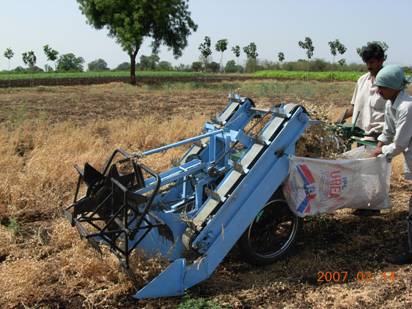

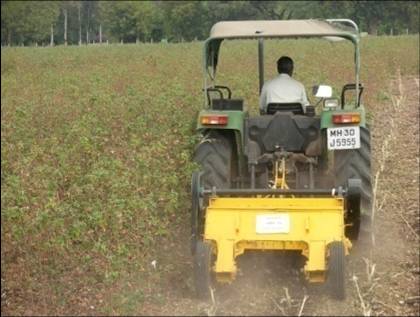


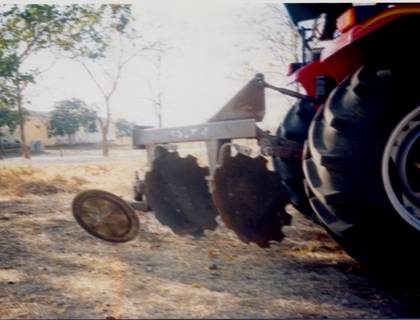





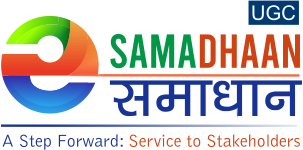
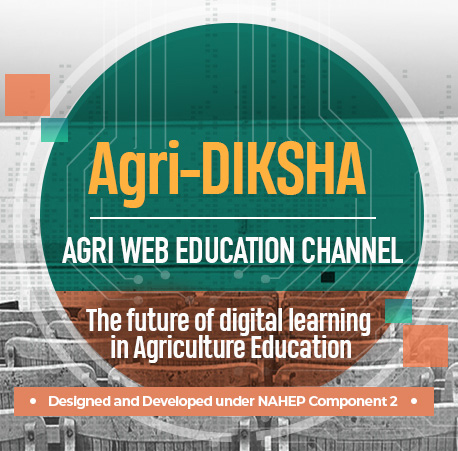

 Krishikosh Repository
Krishikosh Repository





